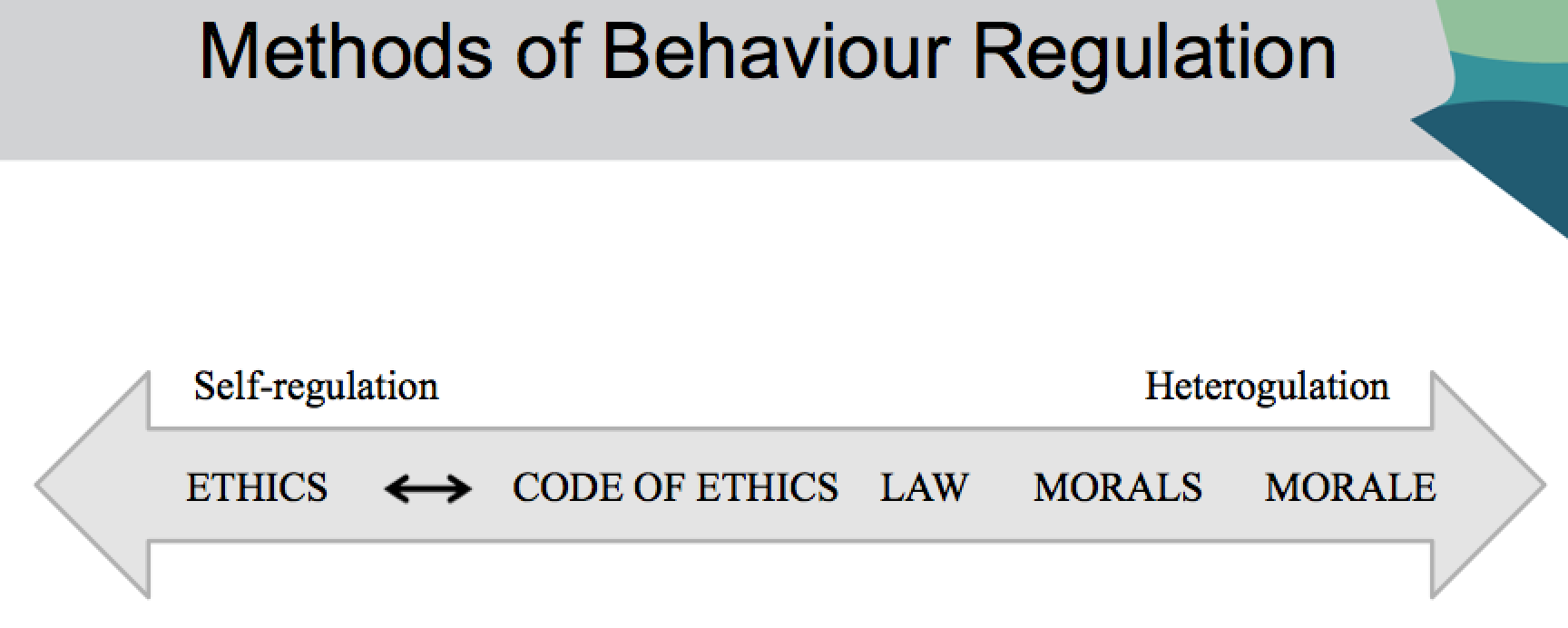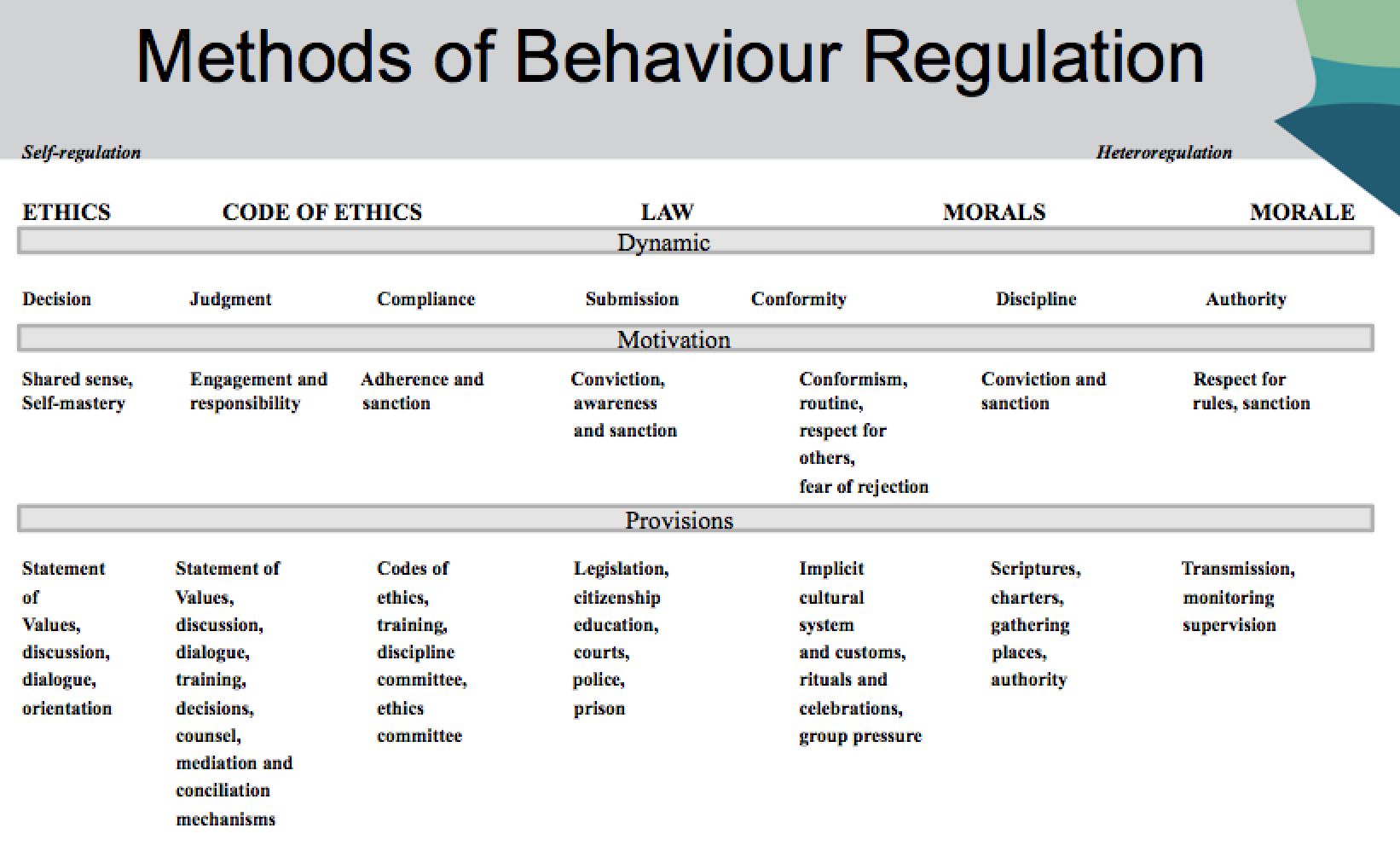Heterogulation
« previous post | next post »
In a Library and Archives Canada presentation on "Values and Ethics", heterogulation might be a neologism:
But it's probably a typo for "heteroregulation", which is used to label an elaborated form of the same scale on the next slide:
(Note that heteroregulation is not exactly a familiar word — it has yet to have its Word Induction Ceremony at the OED or Merriam-Webster — but it's a more-or-less regular English compounding of morphemes borrowed from Greek and Latin.)
Anyhow, it's interesting that "morale" is presented as more heteroregulative than "morals", which in turn are more heteroregulative than "law".
Also, the column under "morale" seems to reflect an odd interpretation of that word: "authority", "respect for rules", "monitoring", "sanction", … (To paraphrase the old joke, "The monitoring and sanctions will continue until morale improves".) Perhaps because of the attitudes thus revealed, the whole exercise doesn't seem to be working out all that well for LAC, morale-wise.
[h/t Faith Jones]


Ben Hemmens said,
March 19, 2013 @ 7:10 am
It's a perfectly crogulent word.
Stan Carey said,
March 19, 2013 @ 7:23 am
"Word Induction Ceremony" reminds me of Hans Stengel's cartoon on grovelling neologisms.
FM said,
March 19, 2013 @ 7:38 am
"Not that heteroregulation is not exactly a familiar word"
Do I see a case of misnegation?
[(myl) No, you see a typo for "Note that heteroregulation …"]
Adam Roberts said,
March 19, 2013 @ 9:29 am
I was intrigued by the implied '-ogulation' suffix. It looked like it ought to be a proper element of a quasi-scientific word, but a quick Google has rather disabused me. Most of the links are to places where the word is clearly a typo for 'ovulation'; although there's one site that promises to elongate my male member whose link I daren't click (I'm at work) and then there's this, frankly baffling, Australian-themed twitter message:
https://twitter.com/firstdogonmoon/statuses/179658811764776961
Does anybody know what that 's about?
Faldone said,
March 19, 2013 @ 9:40 am
No entries in Urban Dictionary for ogulation and no results from onelook for *ogulation.
Mr Punch said,
March 19, 2013 @ 10:36 am
"Ogulation" ought to mean "the act of ogling," so "heterogulation" would mean ogling a member of the opposite sex: "My heterogulation of that babe led to a fight with her boyfriend."
Jonathon Owen said,
March 19, 2013 @ 12:27 pm
I was far more intrigued by the possible application of this schema to the regulation of language behavior.
maidhc said,
March 19, 2013 @ 3:58 pm
This is a very strange scale, even setting aside the "morale" end. Typically you see something like "etiquette" at one end and "laws" at the other end, with "ethics" somewhere in the middle.
David Morris said,
March 19, 2013 @ 4:55 pm
Wikianswers' page on pregnancy includes the question: "When are you ogulating?". The answer given is "What is the derination of ogulating?". There is no answer given to the answer/question given. The page includes a slide show, which I don't think I want to look at. In fact, which I *do* think I *don't* want to look at.
Carl said,
March 19, 2013 @ 7:34 pm
Usually, the word used for this is "heteronomy," which is the opposite of "autonomy."
julie lee said,
March 19, 2013 @ 8:04 pm
What about:
The opposite of "self-regulation" is "other-regulation".
The opposite of "auto-regulation" is "hetero-regulation".
The opposite of "autonomy" is "heteronomy".
The opposite of "self-determination" is "other-determination".
Different ways of expressing the same thing?
Jon Weinberg said,
March 19, 2013 @ 10:07 pm
@Adam Roberts: Apparently Mr. Onthemoon first referenced
ogulation some years ago, and his readers didn't understand it then either.
Bessel Dekker said,
March 20, 2013 @ 2:38 am
Since the presentation has one instance of "heteroregulation" and one of "heterogulation", no neologism seems involved, unless a typo is a neologism. All this does raise the question, however, as to whether typos may create haplologies.
Keith M Ellis said,
March 20, 2013 @ 5:58 am
I'm not sure why they chose morale for this nomenclature, but I think I understand what they had in mind. At the end of the spectrum where the locus of control resides in "other" (as opposed to "self"), which is authoritarian, they want to distinguish the more abstract and more widely applicable moral code from the smaller and more specific imposition of behavioral rules in the context of actual groupings of people.
I've never thought of "morale" this way, but I can change my perspective on it and see it as a sense of a shared code of behavior that is defined entirely within the context of an authoritarian grouping, with the authority embodying that code. It's not really a "code of behavior" so much as it's a shared sense that this person of authority has the responsibility and ability to make decisions about behavior.
In this sense, it's the opposite extreme from what they call "ethics" (as distinct from "code of ethics", so I translate it as "personal ethical decisions") in that the locus of control is fully with the other — but both extremes are actual decisions, not so abstracted, and are somewhat idiosyncratic.
The middle categories are abstracted, widely distributed, and codified.
Again, the continuum is, as the name suggests, one from regulation of self at one extreme to regulation of others at the other extreme. The suggestion is that the abstraction and codification necessarily have some element of consensuality and so this peaks at the middle in "law", while "ethics" and "morale" are the extremes that don't involve consensuality, though they differ in the locus of control.
Keith M Ellis said,
March 20, 2013 @ 6:12 am
Also, I'll add that I find this somewhat interesting from a moral philosophy and sociological perspective in that it's discussing "methods of behavior regulation" and it's self-evidently true that for most/all individuals, different methods apply in different contexts.
And it's also self-evidently true that often different methods apply for different individuals in the same contexts.
So, in a given context, not only will there perhaps be conflict because different individuals will not agree upon which set of rules apply, they may not even agree about which kind or rules apply — that is, where the proper locus of control is. In that latter case, there's likely to be great misunderstanding because my intuition is that typically individuals presume that others share their intuitive sense of what the proper locus of control is. For example, in some given context one person may think the rule of law applies, while another thinks that individual conscience applies, and yet another thinks that "morale" applies … even when they might happen to agree upon the specific rules that apply for individual conscience, law, and morale. The disagreement will seem to each to be that the others are making category errors, which will make dialogue and resolution very difficult.